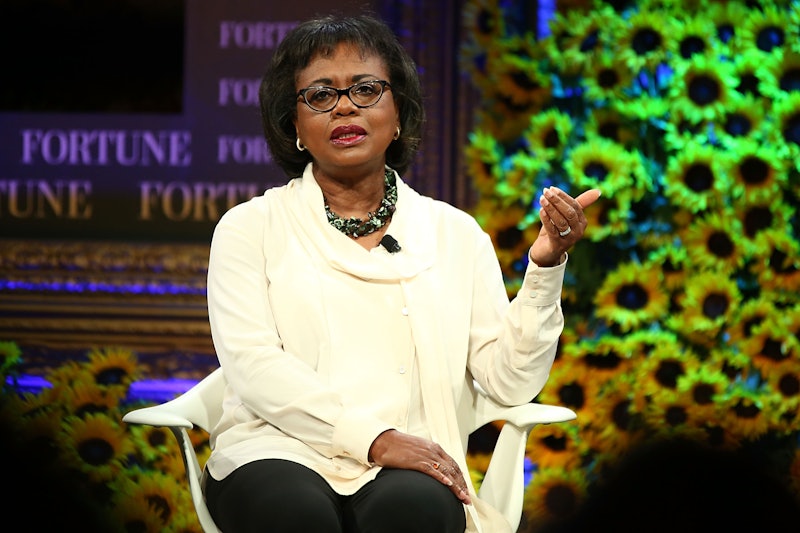News
Why Anita Hill Wants You To Be Hopeful About These Sexual Harassment Revelations

Oftentimes when one woman dares to speak out against sexual harassment, an avalanche of revelations follows. Anita Hill knows that all too well, and she's optimistic that such powerful reckonings will prompt major changes in American culture. Hill tells Bustle she hopes solidarity against sexual harassment will ultimately trump political differences and unite people against sexual abuse.
We have to think of this as a problem that we’re experiencing because of gender and not be divided by our differences.
On Monday night, the attorney and academic attended Glamour's Woman of The Year Awards in Brooklyn, New York, and spoke about the flood of sexual harassment accusations happening nationwide. Her remarks come at an important time in America. After film mogul Harvey Weinstein was accused of sexual misconduct (he has denied allegations of any nonconsensual sexual acts), the narrative on sexual abuse in Hollywood and other industries finally emerged from the shadows.
Hill says young women should be asking themselves questions about this watershed moment and reflecting on what's actually happening. More specifically, she insists that it's vital for women to think about how this national conversation can "change the world or you and make your life better."
"I’m hoping," Hill says, "that you’re seeing that young women are seeing hope come out of these new revelations about sexual harassment and sexual assault, and I’m hoping that you know that we’re working to make the world safer for you."
The lesson on hope coming from Hill seems even more inspiring given her own story. In 1991, Hill accused Supreme Court Justice Clarence Thomas of sexual harassment. Thomas strongly denied the accusations. After she agreed to testify in a televised hearing in front of the Senate, she found herself facing an all-white 14-male member panel that asked her deeply invasive questions about her personal life. One of those questions was whether she was a "scorned" lover seeking to stain Thomas' reputation. Hill said it was "awful."
Among those men was former vice president Joe Biden who received criticism for not stopping the insulting and invasive queries during the hearing. On Monday night at the Glamour event, after more than 20 years, Biden apologized and said, "Let's get something straight here, I believed Anita Hill." Then he added, "I voted against Clarence Thomas."
The only issue in the Anita Hill case was whether or not there could be information submitted in a record without a name attached to it, anonymously accusing someone of something.
Then, Glamour editor-in-chief Cindi Leive told Biden, “Professor Hill has said herself that she expected a fair process and did not feel that she had one." She went on to ask, "Given your leadership on these kinds of issues, do you have any message to her now?” Biden answered,
The message I’ve delivered before is I am so sorry if she believes that. I am so sorry that she had to go through what she went. Think of the courage it took her to come forward.
Both courage and hope are what Americans need right now to come together instead of remaining divided. And it shouldn't matter where you stand on the ideological spectrum. After all, misogyny is deeply embedded in virtually all aspects of society — personal and professional — and neither the left nor right has a monopoly on sexual abuse.
"There is always, especially with my generation, this tendency to let differences divide us, and we cannot be sucked into that," Hill says. "We have to think of this as a problem that we’re experiencing because of gender and not be divided by our differences."
Additional reporting by Rachel Simon.